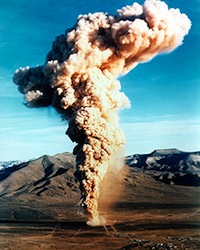A Russian Perspective on CTBT Ratification
November 13, 2009
Featured Image
Some Considerations Regarding the Ratification of the CTBT by the United States: A Russian Perspective - Viktor Slipchenko of the Carnegie Moscow Center [link]
- In light of the fact that the swift ratification of the CTBT by the United States fully corresponds to Russia's interests, it would seem that we, too, should not remain on the sidelines of this debate, especially since a recent statement by the G8 calls on us to take an active stand. In particular, the following steps could be taken:
- First. Confirm our official position at a high level, as made public during the ratification of the Treaty by the State Duma in 2001,(1) that according to the CTBT all test explosions of nuclear weapons are banned, including so-called "hydronuclear experiments," whatever the level of energy released.
- Second. Confirm and develop our 2001 proposal (2) to elaborate with the United States additional measures to build trust and improve transparency with regard to activity on nuclear test sites.
- Third. Step up work with countries like India and Iran on the signing and ratification of the Treaty, which are needed to enable the Treaty to come into force, indicating that such a step would facilitate the expansion of mutually advantageous economic cooperation with Russia and other countries and would improve India’s and Iran’s global reputation.
United States-Japan Joint Statement toward a World without Nuclear Weapons - White House Briefing Room [link]
- Recognizing the challenge to achieve total elimination of nuclear weapons, the Government of the United States and the Government of Japan plan to work actively to create conditions for achieving this objective.
- They express their determination to take the following practical steps on nuclear disarmament and non-proliferation, in a way that promotes international stability and security while ensuring that those steps do not in any way diminish the national security of Japan or the United States of America and its allies.
Russian, U.S. Leaders to Discuss Nuclear Arms Negotiations - Global Security Newswire [link]
- Russian President Dmitry Medvedev and U.S. President Barack Obama plan at a meeting this weekend to discuss ongoing negotiations aimed at replacing the 1991 Strategic Arms Reduction Treaty, Agence France-Presse reported.
- "We are working seriously toward this meeting and expect that it will give a new impulse to cooperation," leading Kremlin foreign policy adviser Sergei Prikhodko said today.
- Obama and Medvedev are expected to hold the face-to-face talks during the Asia-Pacific Economic Cooperation forum in Singapore.
Tauscher Promotes New Missile Defense Plan Before Trip to Europe - Foreign Policy's The Cable [link]
- Undersecretary of State for Arms Control and International Security Ellen Tauscher is in India today, meeting with counterparts before heading to the Czech Republic and Turkey.
- Tauscher previewed her trip and talked about the status of missile defense plans and other strategic initiatives at the George Washington University on Tuesday. Primarily, she rejected the contention that the administration had abandoned Polish and Czech missile defense plans. Both countries have been offered alternative ways to participate in missile defense going forward, she said.
Iran Armed Forces Chief Backs Nuclear Deal - AFP [link]
- Iranian armed forces chief of staff General Hassan Firouzabadi said on Friday he backed proposals for Tehran to ship out most of its stocks of low-enriched uranium in return for fuel for a reactor designed to produce medical isotopes.
- "In obtaining fuel enriched to 20 percent purity for the Tehran reactor, a million of our citizens will benefit from the medical treatment it can enable and we will prove at the same time the bona fides of our peaceful nuclear activities."



